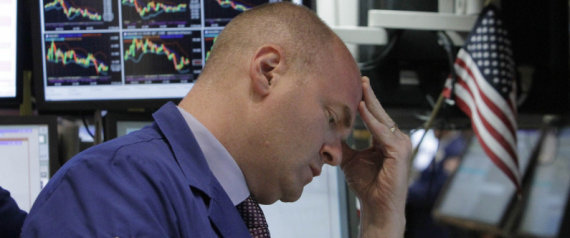
First Posted: 7/11/11 02:23 PM ET Updated: 7/11/11 02:28 PM ET
NEW YORK (Steven C. Johnson) - Two years removed from its worst recession since World War Two, the U.S. economy is still struggling to create jobs, and things could get even tougher if all the talk of belt-tightening in Washington becomes reality.
Data on Friday showed hiring ground to a near halt last month, driving the jobless rate up to 9.2 percent and casting doubt on whether a sluggish U.S. recovery would soon pick up steam.
This all but ensures the Federal Reserve will keep interest rates at record lows well into 2012. But help probably won't be as forthcoming from Congress and the White House, which are locked in battle over cutting a $1.4 trillion budget deficit.
The problem is one of timing: Economists and investors fear that with weak labor and housing markets causing consumers to tighten their own belts, the last thing the economy needs is an aggressive dose of austerity from the federal government.
"The U.S. government has its work cut out for it," said Douglas Borthwick, managing director at Faros Trading in Stamford, Connecticut. "U.S. fiscal problems have been put off for so long that the government has to cut spending at a time when the economy is unable to absorb it."
As a share of output, the $1.4 trillion budget gap expected for the fiscal year ending in September is one of the largest since World War Two.
President Barack Obama and Republican leaders are aiming for savings of $2 trillion to $4 trillion over 10 years but are at odds over the right mix of spending cuts and tax hikes.
A deal is needed by August 2 in order to lift the $14.3 trillion cap on government borrowing.
While that's not an astronomical amount for a $14 trillion economy, it still amounts to tighter policy at a time that many economists say requires even more aggressive federal spending.
Much depends on the size, scope and timing of spending cuts. If they are large enough and take effect next year, they will depress corporate earnings and weigh on equity markets, according to Credit Suisse U.S. equity strategist Doug Cliggott.
Solid corporate earnings and loose monetary and fiscal policies have helped the S&P 500 index double in value since early 2009.
"We really are in a bind here," Cliggott said, "We have to start addressing the deficit, and if it means a rough stretch for corporate profits and the equity market, then they go through a rough stretch. Putting it off is not the answer."
WALKING THE TIGHTROPE
Fed Chairman Ben Bernanke and others have urged lawmakers to reduce the deficit but to back-load the most draconian spending cuts or tax hikes to shield the fragile economy.
"The idea seems to be that reducing the deficit will somehow produce jobs," said Kathy Jones, fixed income strategist at Charles Schwab. "I'm not sure there's a direct correlation there. We need to allow growth now, because stronger growth will help the long-term fiscal outlook."
That's clear in Europe. Facing default, Greece's parliament last week adopted a package of large and unpopular spending cuts and tax hikes in exchange for international aid.
But economists and investors fear the austerity will make it difficult for the country to grow its way back to health.
Britain, too, has been more aggressive than the United States in cutting spending and raising taxes, and the pace of growth slowed to 1.6 percent in the 12 months to March. Markets are even starting to bet the central bank may have to act by pumping more money into the economy.
David Semmens, U.S. economist at Standard Chartered, said the 2012 election may clip even the biggest deficit hawks' wings, as lawmakers won't want to lose votes. A rising jobless rate is an impediment for Obama's reelection chances.
"I think any spending cuts will be aimed at 2013," he said.
"I think any spending cuts will be aimed at 2013," he said.
But history does suggest a commitment to fiscal probity is required for long-term economic health. Cliggott said countries with debt-to-output ratios above 90 percent have traditionally grown at slower rates than those with stronger finances.
"It shows the tightrope that has to be walked," said Greg McBride, senior financial analyst at Bankrate.com. "We've got to rein in the government red ink so we don't in coming years face a day of reckoning. But it's a balancing act, because if you rein it in too much, it will plunge us into recession."
(Editing by Leslie Adler)
